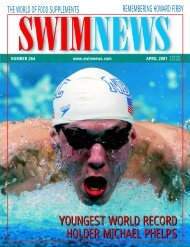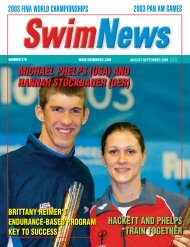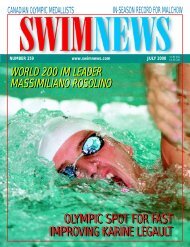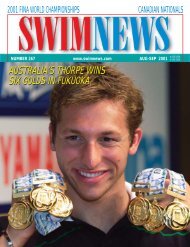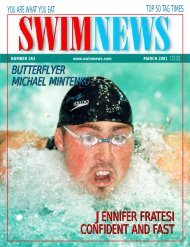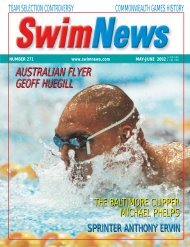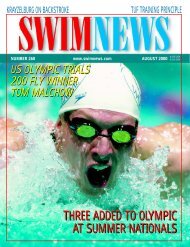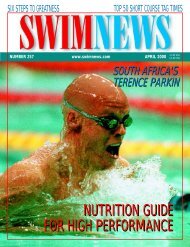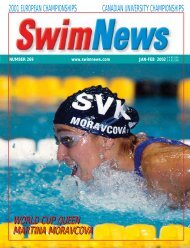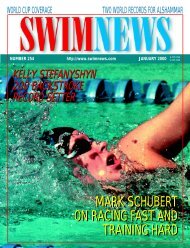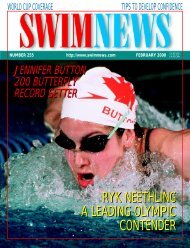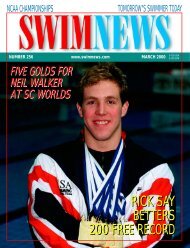Jul - Aug 2002 View the PDF - Swimnews Online
Jul - Aug 2002 View the PDF - Swimnews Online
Jul - Aug 2002 View the PDF - Swimnews Online
You also want an ePaper? Increase the reach of your titles
YUMPU automatically turns print PDFs into web optimized ePapers that Google loves.
MAKING A DAILY DIFFERENCE,CHANGING THE DIRECTION OF A NATIONNikki DrydenOn <strong>the</strong> opening morning of <strong>the</strong> CommonwealthGames, Pakistan’s 18-year-old Sana Abdul Wahidmade her country’s swimming debut in <strong>the</strong> 50 fly.Before that, no Pakistani woman had ever competedin an international competition outside a Muslimcountry. “I am very proud [about being <strong>the</strong> firstwoman from Pakistan to swim outside a Muslimcountry],” she said after her swim of 33.53 in <strong>the</strong> 50fly. “It was very good to be able to swim with so manyexperienced swimmers.”Her 12-year-old teammate Kiran Khan madeher debut on <strong>the</strong> second day, swimming <strong>the</strong> 100 backin 1:16.07. She placed seventh in her heat of seven,touching to a rousing cheer from <strong>the</strong> impressedcrowd. While her time may not be competitive with<strong>the</strong> rest of <strong>the</strong> Commonwealth swimmers, it is for herage. “It’s great to be here, and it’s good to be able tocompete internationally,” she said. “We have 30 ormore very good female swimmers in Pakistan, butunfortunately, <strong>the</strong>y haven’t qualified this time.”Veena Masud is <strong>the</strong> woman behind <strong>the</strong> creationof women’s swimming in Pakistan; before that shehelped break down <strong>the</strong> barriers to civilian men’sswimming in <strong>the</strong> early 1990s. Masud’s 10-year-oldson Kamal started beating men from <strong>the</strong> armedforces (<strong>the</strong> group that dominated swimming inPakistan), and at <strong>the</strong> 1992 Asian Championships inHiroshima, she was approached by <strong>the</strong>n Hong Konghead coach Bill Sweetenham. He told her that herson had potential and asked if she would send him toHong Kong for training. She and her husband saidno, but Sweetenham began to fax her workouts, andMasud started coaching her son.Kamal went on to compete in <strong>the</strong>Commonwealth Games in 1994, <strong>the</strong> Olympics in1996, and was recruited to swim at MercersburgAcademy in high school, and John’s Hopkins foruniversity. But when Kamal left for <strong>the</strong> US, Masuddecided she needed to give o<strong>the</strong>rs <strong>the</strong> same opportunityher son had had. “My son’s success had aroused a lotof attention from <strong>the</strong> young children in my city, so Iand four o<strong>the</strong>r women formed a women’sorganization to run swim meets for girls.” All <strong>the</strong>irmeets were run within <strong>the</strong> Islamic Code, and <strong>the</strong>ywere such a success that <strong>the</strong>y approached <strong>the</strong>government about sending a team to <strong>the</strong> IslamicWomen’s Games in which only women compete,coach, and officiate.The team first competed in 1997 in Tehran at<strong>the</strong> second Islamic Games, coming home withhandfuls of medals. But <strong>the</strong> girls wanted to competeat a higher level, so Masud began to think of ways towork around <strong>the</strong> Islamic Code. She thought, “If <strong>the</strong>track and field athletes were allowed to compete inlong tights, perhaps <strong>the</strong> swimmers could wear <strong>the</strong>new body suits and compete in mixed competition.”So when Masud spoke to <strong>the</strong> press, she began to referto <strong>the</strong> body suits as <strong>the</strong> Islamic costumes, and whenshe proposed her idea to <strong>the</strong> government <strong>the</strong>y neverquestioned it.Wahid and Khan were selected for this year’sGames because <strong>the</strong>y are <strong>the</strong> two fastest women inPakistan. At 18, Wahid is one of <strong>the</strong> pioneers ofwomen’s swimming in Pakistan. She is <strong>the</strong> defendingNational Champion for five years running and holdseight national records. Masud says, “Sana is extremelycompetitive and she just wants to grow and compete.This experience will make a big difference.”Khan is just 12 years old, and is also a nationalchampion, but because of her age, <strong>the</strong> objective is togroom Khan at this competition. “Kiran is veryyoung,” says Masud, “but she is a good swimmer. Sheis coached by her fa<strong>the</strong>r, who is very keen andmotivated.”Five years ago, <strong>the</strong>re were no women competingin swimming in Pakistan. Now in her home city ofKarachi, Masud has meets with over 250 girls, andshe estimates <strong>the</strong>re are over 10,000 women swimmingin Pakistan. There are clubs in every major city andwork is being done now to get girls and families in <strong>the</strong>rural areas interested and competing in swimming.“It will take time,” says Masud. “But <strong>the</strong> key will beto work in <strong>the</strong> smaller towns to grow <strong>the</strong> sport.” Evenin <strong>the</strong> more conservative province of Peshawar,bordering on Afghanistan, <strong>the</strong>re is even a team of fivegirls asking Masud for her training and technicalexpertise.As far as Masud fitting into <strong>the</strong> bigger picture, apicture where women swimming in <strong>the</strong> Muslim nationof Pakistan seems in <strong>the</strong> shadow of 9/11 to be a majorpolitical and social feat, Masud is very humble of herrole. “All those political agendas seem to turn into alot of ego trips. I am an educator and coach and Ibelieve you have to make change with <strong>the</strong> peoplearound you, and it will catch like a virus.”With a great deal of understanding andcompassion, Masud is passionate about <strong>the</strong> changeshe is making to peoples lives. “There is so muchconfusion in <strong>the</strong> world because of religion. Look at all<strong>the</strong> wars being fought because of it. I feel that takesaway from what religion means. For me, making adifference every day, a difference to someone’s life,that’s my life. Nothing else is important, and that iswhy I do this.”but said she was buoyed by <strong>the</strong> English crowd. “Youdo have last minute nerves, but <strong>the</strong> race went exactlyas I had planned. I wanted to take it out from <strong>the</strong> startand keep building on my lead.”Day Five, Saturday, <strong>Aug</strong>ust 3Canada’s Mike Mintenko managed to break up <strong>the</strong>Aussie flying duo of Geoff Huegill and Adam Pine byplacing second to Huegill in <strong>the</strong> 100 fly. Tank andSkippy battled it out to <strong>the</strong> 75, until Huegill surged tovictory. Both men were off <strong>the</strong>ir best times, finishingin 52.36 and 52.80. “I felt great to <strong>the</strong> 75,” saidMintenko. “I just have to work on <strong>the</strong> last 10 metres,and hopefully in three weeks at Pan Pacs, it will comethrough.”With a kilt-clad team to cheer her on, Scotland’sAlison Sheppard defended her title in <strong>the</strong> 50 free.Sheppard has perfected <strong>the</strong> first 25 metres of thisevent, getting a body-length lead by half way. “I’m sopleased to do that in front of a home crowd,” saidSheppard. “I didn’t look where anyone else was, I justwanted to swim my own race.” Canada’s LauraPomeroy was fifth after breaking <strong>the</strong> Canadian recordwith a 25.85 in <strong>the</strong> heats. “That wasn’t as fast as Iwould have liked, but I am happy to be in <strong>the</strong> final,”said Pomeroy. “It is really exciting to be in <strong>the</strong> finalas I wasn’t seeded top eight coming into this meet. Soto get fifth in my first international meet is prettygood.”It was one, two, three for England as JamesGibson, Adam Whitehead, and Darren Mew swept <strong>the</strong>50 breast. Mew missed a medal in <strong>the</strong> 100, so wasparticularly happy. “We came here determined to gofor a 1-2-3 and now we’ve done it,” said Mew. “It’stremendous and a real boost to <strong>the</strong> team for <strong>the</strong> restof <strong>the</strong> night and <strong>the</strong> rest of <strong>the</strong> Games.”England continued to sizzle, sweeping <strong>the</strong>irsecond event in one night. This time it was <strong>the</strong>women’s turn in <strong>the</strong> 200 back. Sarah Price led fromstart to finish with her flawless backstroke; her headis completely still while she swims, with a fluid rolland steady kick. Price’s first 50 was under worldrecordpace, but she faded slightly in <strong>the</strong> secondhundred to finish with her fifth PB of <strong>the</strong> meet, a2:10.58. The rest of <strong>the</strong> race was up for grabs forwhomever was tough enough to step up. Two Englishgirls, Jo Fargus and Katy Sexton, did just that, finishingin second and third with 2:11.60 and 2:12.01respectively.“I’m over <strong>the</strong> moon,” said Price. “I was sonervous because <strong>the</strong>se girls are so tough. It’s so greatthat we got 1-2-3!”Perhaps <strong>the</strong> most anticipated event of <strong>the</strong>competition, <strong>the</strong> men’s 100 back, saw Matt Welsh outfor blood and Ian Thorpe out for his sixth gold. Thequestion on everyone’s mind: Could Thorpedo beatWelsh? Well, it was not to be. Welsh led from wall to(continued on page 12)10SWIMNEWS / JULY-AUGUST <strong>2002</strong>



